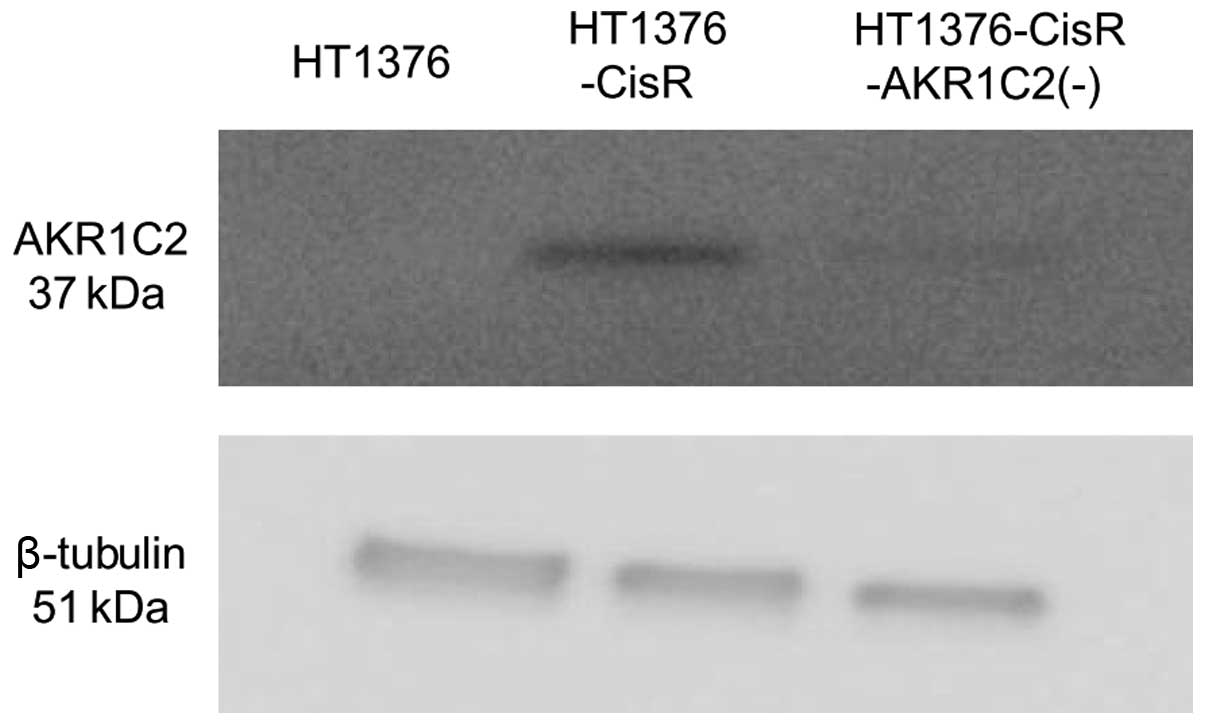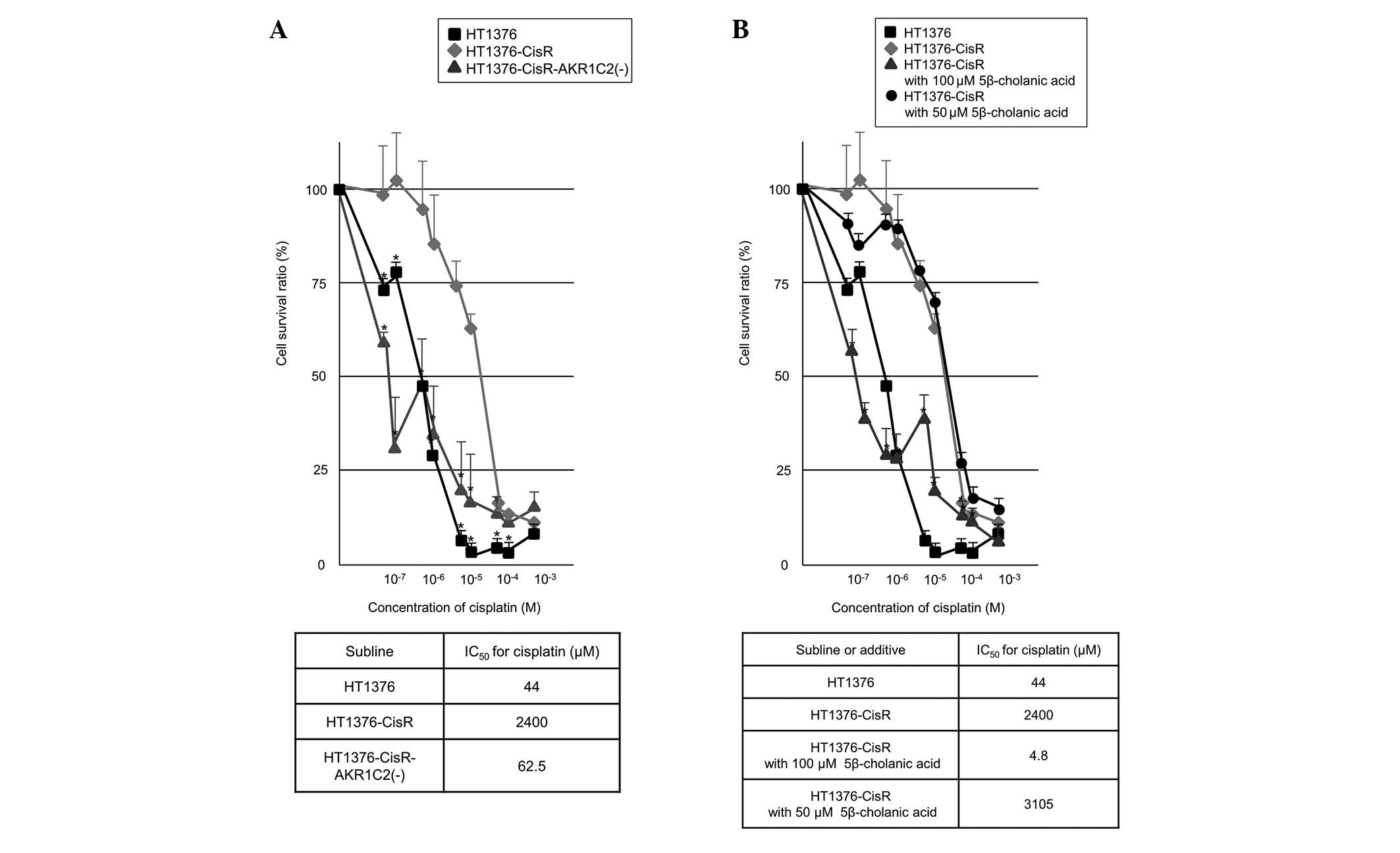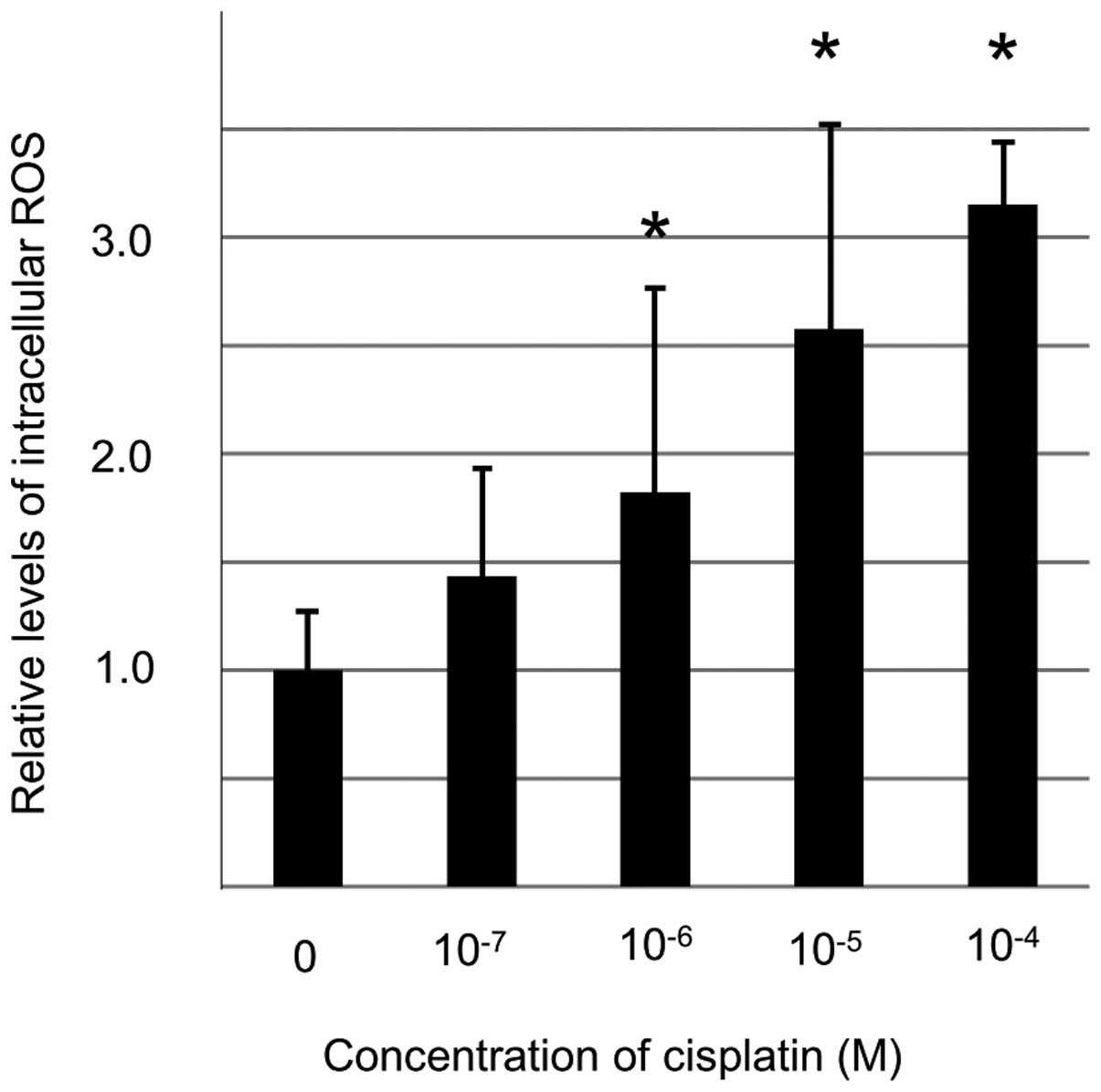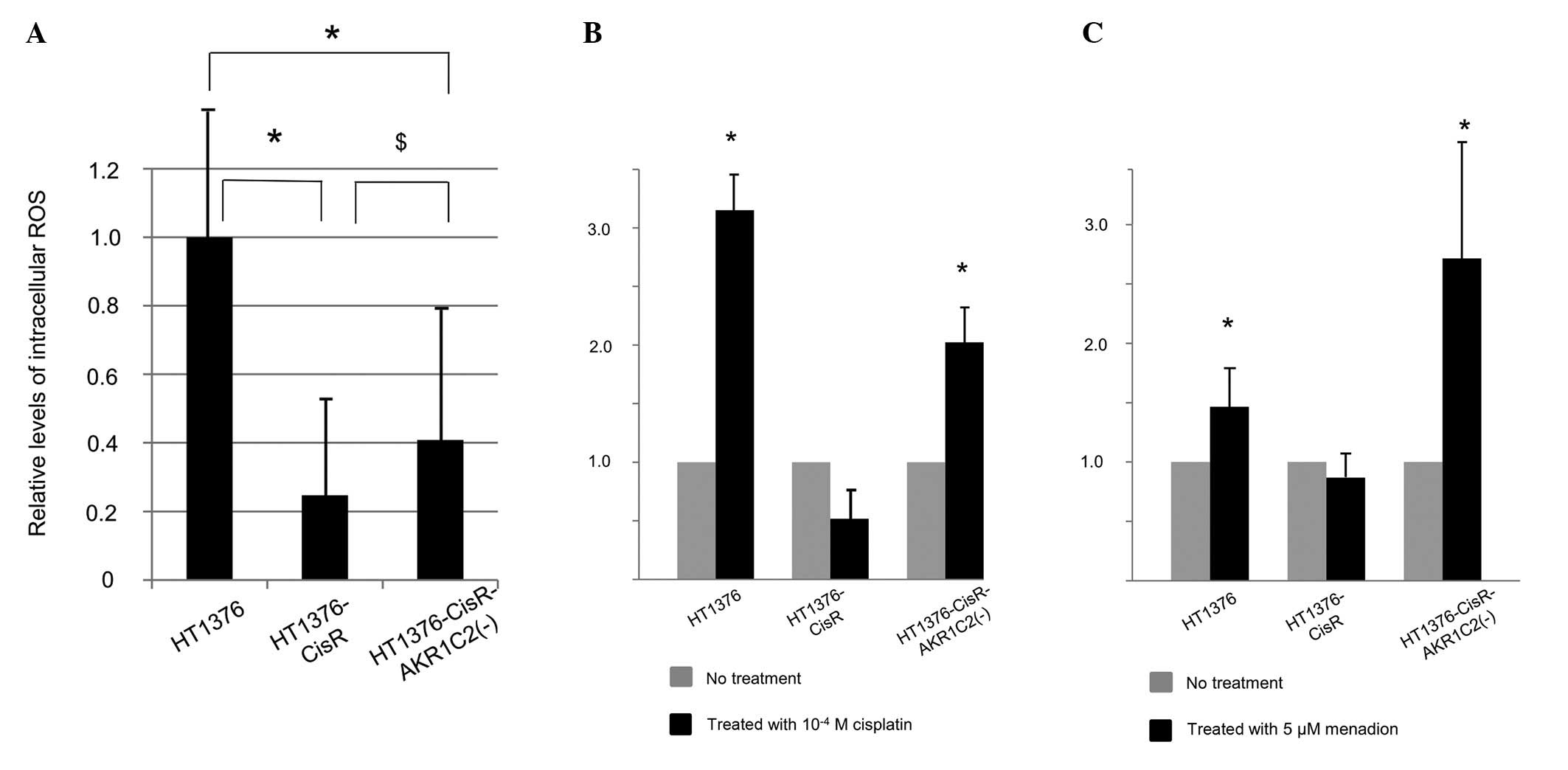|
1
|
Logothetis CJ, Dexeus FH, Finn L, et al: A
prospective randomized trial comparing MVAC and CISCA chemotherapy
for patients with metastatic urothelial tumors. J Clin Oncol.
8:1050–1055. 1990.PubMed/NCBI
|
|
2
|
von der Maase H, Hansen SW, Roberts JT, et
al: Gemcitabine and cisplatin versus methotrexate, vinblastine,
doxorubicin, and cisplatin in advanced or metastatic bladder
cancer: results of a large, randomized, multinational, multicenter,
phase III study. J Clin Oncol. 18:3068–3077. 2000.
|
|
3
|
Tanji N, Ozawa A, Miura N, et al:
Long-term results of combined chemotherapy with gemicitabine and
cisplatin for metastatic urothelial carcinomas. Int J Clin Oncol.
15:369–375. 2010. View Article : Google Scholar : PubMed/NCBI
|
|
4
|
Miura N, Takemori N, Kikugawa T, et al:
Adseverin: A novel cisplatin-resistant marker in the human bladder
cancer cell line HT1376 identified by quantitative proteomic
proteomic analysis. Mol Oncol. 6:311–322. 2012. View Article : Google Scholar : PubMed/NCBI
|
|
5
|
Veitch ZW, Guo B, Hembruff SL, et al:
Induction of 1C aldoketoreductases and other drug dose-dependent
genes upon acquisition of anthracycline resistance. Pharmacogenet
Genomics. 19:177–188. 2009. View Article : Google Scholar : PubMed/NCBI
|
|
6
|
Chen J, Adikari M, Pallai R, et al:
Dihydrodiol dehydrogenases regulate the generation of reactive
oxygen species and the development of cisplatin resistance in human
ovarian carcinoma cells. Cancer Chemother Pharmacol. 61:979–987.
2008. View Article : Google Scholar
|
|
7
|
Matsunaga T, Yamane Y, Iida K, et al:
Involvement of the aldo-keto reductase, AKR1B10, in mitomycin-c
resistance through reactive oxygen species-dependent mechanisms.
Anticancer Drugs. 22:402–408. 2011. View Article : Google Scholar : PubMed/NCBI
|
|
8
|
Chen J, Emara N, Solomides C, et al:
Resistance to platinum-based chemotherapy in lung cancer cell
lines. Cancer Chemother Pharmacol. 66:1103–1111. 2010. View Article : Google Scholar : PubMed/NCBI
|
|
9
|
Chow KC, Lu MP and Wu MT: Expression of
dihydrodiol dehydrogenase plays important roles in apoptosis- and
drug-resistance of A431 squamous cell carcinoma. J Dermatol Sci.
41:205–212. 2006. View Article : Google Scholar : PubMed/NCBI
|
|
10
|
Wang HW, Lin CP, Chiu JH, et al: Reversal
of inflammation-associated dihydrodiol dehydrogenases (AKR1C1 and
AKR1C2) overexpression and drug resistance in nonsmall cell lung
cancer cells by wogonin and chrysin. Int J Cancer. 120:2019–2027.
2007. View Article : Google Scholar : PubMed/NCBI
|
|
11
|
Tai HL, Lin TS, Huang HH, et al:
Overexpression of aldo-keto reductase 1C2 as a high-risk factor in
bladder cancer. Oncol Rep. 17:305–311. 2007.PubMed/NCBI
|
|
12
|
Huang KH, Chiou SH, Chow KC, et al:
Overexpression of aldo-keto reductase 1C2 is associated with
disease progression in patients with prostatic cancer.
Histopathology. 57:384–394. 2010. View Article : Google Scholar : PubMed/NCBI
|
|
13
|
Tardito S, Bussolati O, Maffini M, et al:
Thioamido coordination in a thioxo-1,2,4-triazole copper(II)
complex enhances nonapoptotic programmed cell death associated with
copper accumulation and oxidative stress in human cancer cells. J
Med Chem. 50:1916–1924. 2007. View Article : Google Scholar
|
|
14
|
Siddik ZH: Cisplatin: mode of cytotoxic
action and molecular basis of resistance. Oncogene. 22:7265–7279.
2003. View Article : Google Scholar : PubMed/NCBI
|
|
15
|
Hour TC, Lai YL, Kuan CI, et al:
Transcriptional up-regulation of SOD1 by CEBPD: a potential target
for cisplatin resistant human urothelial carcinoma cells. Biochem
Pharmacol. 80:325–334. 2010. View Article : Google Scholar : PubMed/NCBI
|
|
16
|
Tsunoda T, Koga H, Yokomizo A, et al:
Inositol 1,4,5-trisphosphate (IP3) receptor type1
(IP3R1) modulates the acquisition of cisplatin
resistance in bladder cancer cell lines. Oncogene. 24:1396–1402.
2005.
|
|
17
|
Richon VM, Schulte N and Eastman A:
Multiple mechanisms of resistance to
cis-diamminedichloroplatinum(II) in murine leukemia L1210 cells.
Cancer Res. 47:2056–2061. 1987.
|
|
18
|
Eastman A and Schulte N: Enhanced DNA
repair as a mechanism of resistance to
cis-diamminedichloroplatinum(II). Biochemistry. 27:4730–4734. 1988.
View Article : Google Scholar : PubMed/NCBI
|
|
19
|
Teicher BA, Holden SA, Kelley MJ, et al:
Characterization of a human squamous carcinoma cell line resistant
to cis-diammine-dichloroplatinum(II). Cancer Res. 47:388–393.
1987.PubMed/NCBI
|
|
20
|
Rabik CA and Dolan ME: Molecular
mechanisms of resistance and toxicity associated with platinating
agents. Cancer Treat Rev. 33:9–23. 2007. View Article : Google Scholar : PubMed/NCBI
|
|
21
|
Sodhi A and Gupta P: Increased release of
hydrogen peroxide (H2O2) and superoxide anion
(O2−) by murine macrophages in vitro after
cis-platin treatment. Int J Immunopharmacol. 8:709–714. 1986.
|
|
22
|
Bragado P, Armesilla A, Silva A and Porras
A: Apoptosis by cisplatin requires p53 mediated p38alpha MAPK
activation through ROS generation. Apoptosis. 12:1733–1742. 2007.
View Article : Google Scholar : PubMed/NCBI
|
|
23
|
Huang HL, Fang LW, Lu SP, et al:
DNA-damaging reagents induce apoptosis through reactive oxygen
species-dependent Fas aggregation. Oncogene. 22:8168–8177. 2003.
View Article : Google Scholar
|
|
24
|
Nguyen T, Nioi P and Pickett CB: The
Nrf2-antioxidant response element signaling pathway and its
activation by oxidative stress. J Biol Chem. 284:13291–13295. 2009.
View Article : Google Scholar : PubMed/NCBI
|
|
25
|
Halim M, Yee DJ and Sames D: Imaging
induction of cytoprotective enzymes in intact human cells:
coumberone, a metabolic reporter for human AKR1C enzymes reveals
activation by panaxytriol, an active component of red ginseng. J Am
Chem Soc. 130:14123–14128. 2008. View Article : Google Scholar
|
|
26
|
Trachootham D, Alexandre J and Huang P:
Targeting cancer cells by ROS-mediated mechanisms: a radical
therapeutic approach? Nat Rev Drug Discov. 8:579–591. 2009.
View Article : Google Scholar : PubMed/NCBI
|


















